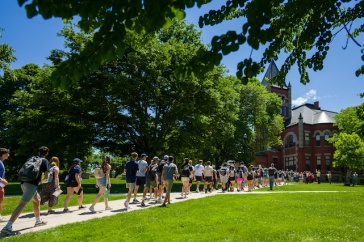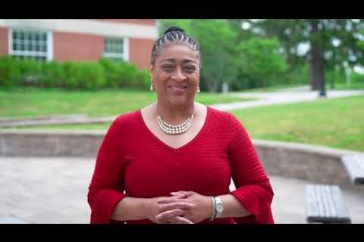|
|
Chao Yang remembers the moment she knew she would someday come to America. She was a five-year-old, watching television with her parents. There was a Thanksgiving scene: a large turkey, a beautifully set table. She even remembers the shiny silverware.
Yang asked her parents about the scene and they told her it was from the most powerful country in the world, and that if she learned to speak English, she could visit one day.
“It has been my dream ever since then. Whatever I did in China, I did with the goal of coming here. I saw the TV, the clothes, the American babies and I fell in love,” says Yang, who will graduate from UNH in May with a master’s degree in recreational management and policy. “I found this intrinsic connection with America.”
Ukrainian native Ganna Suprunenko’s connection with America was forged during the summers of 2010 and 2011 in Delaware where she landed after applying for a summer work-travel program through her college in the Ukraine. In 2012, Suprunenko came to UNH to pursue a master’s degree in civil engineering. She, too, will graduate in May.
Ivaylo Nedyalkov, a Ph.D. candidate in mechanical engineering, found his way to Durham from his home in Bulgaria via Sweden, when, studying for a master’s degree at Chalmers University, he met an American professor who recommended UNH. Nedyalkov will complete his Ph.D. in December.
The three belong to UNH’s 924-member international student community. Of those, 270 are new to UNH this year. Most of the students come from China, Brazil, India, Canada, Iran, Vietnam, South Korea, Saudi Arabia and Nepal.
For Yang, Suprunenko and Nedyalkov, adjusting to living and going to school in a foreign country wasn’t as difficult as one might think. They weren’t overwhelmed. They didn’t get homesick. All of their families encouraged them to come. There were bumps, naturally, but for the most part, they have navigated the cultural differences with ease.
“It wasn’t very hard,” says Nedyalkov, who specialized in English at the language high school he attended in Bulgaria. “I’d say one of my biggest adjustments was how quiet it is in Durham. I had to get used to things closing early. It took a little time to get into my shoes here but everyday life isn’t all that different. ”
In fact, life here has become so routine that it is his new norm. “Now when I go home, it’s reverse culture shock,” Nedyalkov says.
When Suprunenko arrived at UNH, she kept waiting to feel depressed. The shock for her was, it didn’t happen.
“I was absolutely delighted,” she says. “That first summer, I went to orientation and I really loved it. The Office of International Students and Scholars did an amazing job helping us all feel welcome.”

Ganna "Ana" Suprunenko (3rd from right) and Ivaylo "Ivo" Nedyalkov (2nd from right) at an international student event. |
She did, however, have trouble with the language. She speaks English well but in class when it came to the technical aspects of engineering, she found it difficult to express herself.
“I’d know the answer but I couldn’t put it into English,” Suprunenko says. “I felt I had to be silent. That felt horrible. It took me about two months to adjust.”
Part of the reason was that her studies were more in-depth. In the Ukraine, she learned all aspects of engineering. Here at UNH, with a more specific focus, she had to fill in the gaps in background information and, at the same time, keep up with new material.
Yang started studying English when she was 12 years old, during her first year of middle school. Like Suprunenko, she had been to America before she entered UNH, working as an interpreter for a disabled girl who was meeting with doctors in Florida.
“My first time here I knew it would be short. The second time, I knew it was going to be intense. I was anxious but excited,” Yang says of beginning her studies at UNH. You wonder how you will fit in this culture; how will you find out who you really are.”
And while there have been times when trying to figure that out has been hard, it hasn’t been anymore so, she speculates, than if she were back in China. “There would be something hard about being there, too. It would just be a different kind of hard,” she says.
Suprunenko thinks that’s true. And hard here is her preference. All three mention the increased career opportunities in the United States over their home countries, a fact that doesn’t surprise any of them.
So what does?
“The Internet is slower here than in Bulgaria,” Nedyalkov says. “And you have power outages: how can that be?” Even more baffling: Honey Boo Boo. “There isn’t an equivalent in Bulgaria. But I do understand the humor of ‘South Park’ more now than I did when I watched it at home.”
For Yang it has been the small things: When she heard someone talking about using noodles to race in a swimming pool, she thought they meant spaghetti. Working in a group and having to decide who would be the leader, the other students put their fingers on their noses to indicate they didn’t want the role.
“They were surprised I didn’t know what it meant. I said ‘I’m from China, how would I know?’” Yang said.
For Suprunenko, it was more about the academics: that she could speak up, and her professors would listen.
About a year ago, she was Skyping with a friend back home who asked her if she would make the same choice again about coming to America, given how hard she’d had to work and how much she had to study.
“I said, ‘Yes, I would do it once, twice, three times more. It is all worth the effort,” Suprunenko says.
And what of Yang’s first impression all those years ago when she was a little girl, does it still stand up, her love of America?
“Yes,” she says. “Here I feel like a fish in water—that this is my water.”
Learn more:
-
Written By:
Jody Record ’95 | Communications and Public Affairs | jody.record@unh.edu

















































 Chao "Yvonne" Yang
Chao "Yvonne" Yang

